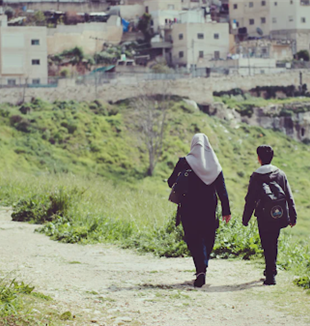
Fragile Bonds in the Holy Land
Struggling against an erosion of trust and friendship. Published in Commonweal.A few weeks after the outbreak of war between Israel and Hamas, a shipping container from Europe arrived in the coastal Israeli city of Ashdod. Its final destination was the Terra Sancta Museum in Jerusalem’s Old City. Vincenzo Zuppardo, an Italian architect and preservationist managing the transfer of the container to Jerusalem, ran into an unexpected problem. The Jewish driver hired to bring the container from Ashdod to the Old City now refused to do so. The Terra Sancta Museum is located in the Muslim Quarter of the Old City, and the Jewish man was afraid to enter an Arab part of town. Eventually, Vincenzo arranged for the driver to drop off the container in a Jewish neighborhood in Jerusalem. But once it arrived there, the Palestinians hired to unload the container also refused to do their job. They were afraid to enter a Jewish part of town. “‘Fear’ is the right word for what we are going through,” Vincenzo says.
The journalist Chris Hedges once wrote that small acts of decency during wartime are important because they “make it impossible to condemn, legally or morally, an entire people.” For decades, cultural institutions (like the Terra Sancta Museum) and religious organizations (like the Franciscan friars, who sponsor the museum) have hoped to bring peace to the Holy Land by building networks of cooperation and friendship. Today, as the museum-container episode suggests, those hopes are evaporating.
Hamas’s brutal October 7 attack on southern Israel and the ensuing Israeli bombing and invasion of Gaza have destroyed thousands of innocent lives and displaced many more. In other parts of Israel and Palestine, the war is also destroying those same networks of friendship and cooperation that were once seeds of hope. The Gaza War is renewing the deep distrust between ordinary Palestinians and Israelis, making small acts of decency all the more difficult. This tragedy has been clearly described by Cardinal Pierbattista Pizzaballa, the Latin patriarch of Jerusalem: “After this crisis…it will be really difficult to rebuild not only the destroyed buildings…but the trust and relations between Israelis and Palestinians, which is a true necessity, because Israelis and Palestinians will still be here after this [war], and will have to deal with each other, whether they want to or not.”
Continue reading on commonwealmagazine.org